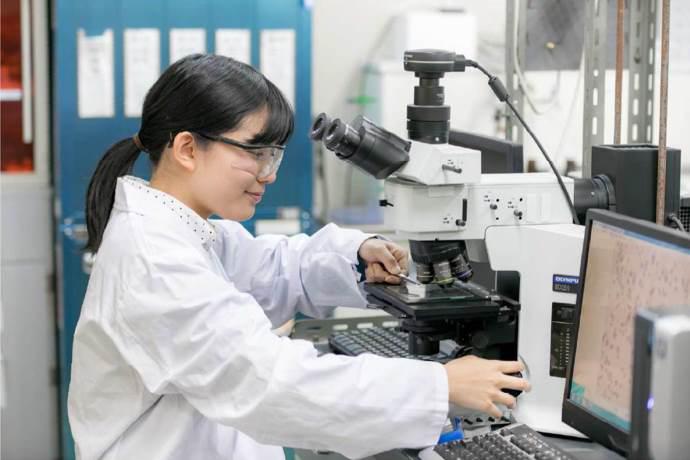
Applied Chemistry and Life Science

Applied Chemistry and Biotechnology for the sustainable future
In the applied chemistry and life science field, the department conducts education and research in scientific fields closely related to both the environment and life, and related advanced environmental technologies, and develops human resources who can contribute to the happiness and development of humanity based on coexistence with nature, and engineers who can be active in the international community.
This course/major includes a life and materials science course and a sustainable development course.
The life and materials science course consists of the biotechnology field and the molecular functional chemistry field. Through learning in fundamental and special subjects related to life science, genetic engineering, biotechnology, organic chemistry, polymer chemistry, separation/analysis chemistry, applied chemistry, and nanotechnology, etc., including practical education in experiments/practical learning, this course develops human resources who can play an active role in the life sciences and chemistry fields and take responsibility for advanced technology.
The sustainable development course consists of the ecological engineering field and the advanced environmental technology field, and through learning in fundamental and specialist subjects related to environmental ecochemistry, socio-ecology engineering, environmental engineering, physical chemistry, inorganic chemistry, chemical engineering, and advanced electronics applied technology, etc., and practical education in experiments/practical learning, the course develops human resources with knowledge of environmental science and engineering applications that can contribute to the sustainable development of society.
In all our educational courses, we train leading engineers who possess a broad perspective and thinking skills not limited by narrow specialization, and who can be active internationally. Through this education and research, we aim to form research bases in the fields of environment and biotechnology enabling the coexistence of the earth and mankind.
Fields of Study
Bioscience and Biotechnology
The Bioscience and Biotechnology field cultivates the engineers and researches who play essential roles internationally in the society of humankind with extensive knowledge based on Life science, Genetic Engineering, and Biotechnology. This field consists of the Molecular Genetics, Genetic Engineering, Biomolecular Engineering, Water Environmental Bioengineering and Physiological Bioscience. Our programs and practices provide the advanced engineers and researchers acquired the ability to their skills to new technology and the forefront of the Life Science.
Applied Chemistry
The molecular functional chemistry field develops human resources with extensive knowledge of applied chemistry such as organic chemistry, polymer chemistry, separation/analysis chemistry, and interface chemistry, as well as materials engineering and nanotechnology, who can take responsibility for modern advanced technology and be active internationally in the applied chemistry field. This field consists of the following research fields: development of asymmetric catalysts, antibody-based immunoassays and natural products, synthesis of organofluorine compounds and its application to drug discovery, synthesis and properties of liquid crystalline molecules, chiral polymer synthesis and its application to asymmetric catalysis synthesis, properties and crystallization of biobased and biodegradable polymers, development of functional polymer microsphere, development of high-performance separation and extraction media in separation science, X-ray crystallography, development of nanomaterials based on supramolecular science.
Through this research, students learn the fundamentals and applications of applied chemistry, materials engineering, and nanotechnology, and acquire skills necessary to become leading engineers and researchers engaged in cutting-edge research and development related to molecular functional chemistry.
Advanced Environmental Technology
The Advanced Environmental Technology field provides students with a wide range of knowledge on materials science, materials chemistry, electrical and electronic engineering, and reaction engineering, etc., and develops human resources with the skills to control environmental risks and reduce environmental impacts who can be active internationally. This field consists of the following research fields: Applications of porous materials to environmental protection and energy gas storage, advanced energy technology development using physicochemical methods, technologies using discharge plasma/electrostatics, application technology development for superconducting sensors, and development of new inorganic materials. Through this research, students learn the fundamentals and applications of applied chemistry, chemical engineering, and biological sciences, and acquire skills as leading engineers and researchers engaged in cutting-edge research and development, such as manufacturing, developing new processes and mechanisms, and developing sensing technologies, etc.
Ecological Engineering
The Ecological Engineering field provides students with a wide range of knowledge on chemistry, chemical engineering, and environmental engineering, etc. and develops human resources with the skills to research and develop the technology necessary for the survival of human beings and the maintenance of ecosystems on the earth, who are capable of working internationally. This field consists of the following research fields: research and development of solid catalysts and catalytic reaction systems for environmental purification, conservation, and low environmental impact reaction processes; synthesis and structural and functional analysis of rare earth manganite materials; establishment of environmental evaluation and prediction models at plant factories; and development of biomass utilization systems for the recycling-oriented society. Through this research, students learn everything from the fundamentals of applied chemistry, resource recycling engineering, and ecological engineering to application and social implementation, and acquire skills as leading engineers and researchers who can contribute to the further development of society through designing ecosystems, building environmentally-friendly industrial and energy processes, and conducting research and development on technologies for environmental conservation and restoration toward the realization of a sustainable society.
Courses
Applied Chemistry Course
Life Science Course
[Date Created]10 Oct 2010 / [Date Updated]3 Apr 2020



